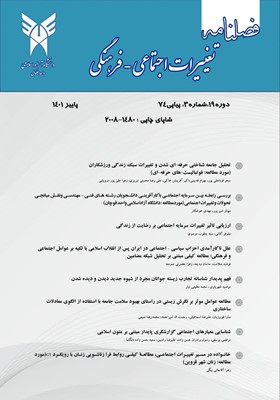خانواده در مسیر تغییرات اجتماعی، مطالعه کیفی روابط فرازناشویی زنان با رویکرد GT (مورد مطالعه: زنان شهر قزوین)
محورهای موضوعی : تحولات اجتماعی
1 - استادیارگروه جامعه شناسی،واحد تهران،دانشگاه آزاد تهران شمال،تهران،ایران
کلید واژه: تغییرات اجتماعی, شهر قزوین, روابط پنهان, رابطۀ فرازناشویی,
چکیده مقاله :
هدف پژوهش حاضر، شناسایی علل تغییرات ساختار خانواده و دلایل ورود زنان در مدل مفهومی رابطۀ فرازناشویی است. پژوهش با رویکرد کیفی و روش گراندد تئوری انجام شد. تکنیک گردآوری دادهها، مصاحبۀ ساخت نیافته و دادههای مورد نیاز از مصاحبه با هفده نفر از زنان ساکن شهر قزوین که تجربۀ رابطۀ فرازناشویی داشتند، جمعآوری و انتخاب مصاحبهشوندگان با روش نمونهگیری هدفمند که نیازمند استفاده از نمونهگیری متوالی به نام گلولۀ برفی است، انجام شده است؛ در این پژوهش از اعتبار زاویهبندی استفادهشده است. بر اساس یافتهها، شرایط علّی این پژوهش تنوعطلبی جنسی، عدم مهارت و دانش جنسی و توجیه رابطۀ فرازناشویی و عدم حضور همسر شناسایی شدند. پدیدۀ محوری روابط فرازناشویی که در زمینۀ جایگزینی برای رشد روابط اجتماعی و تغییر ارزشهای اجتماعی، افزایش اوقات فراغت و تسهیل گری فنآوریهای نوین پدید آمده است. فردگرایی، دوسویگی جنسیتی، بیتفاوتی همسر، فرودستی زن در کسب درآمد بهعنوان شرایط مداخلهگر و درنهایت اینکه زنان در این کنش و واکنشها، با اقدام به رابطۀ فرازناشویی و با میل به مصرفگرایی، مدیریت بدن و تردید داشتن در ادامۀ زندگی و توجیه این رابطه، پیامدهایی چون افزایش لذتگرایی و عادی شدن رابطۀ فرازناشویی را خلق کردند.
The current research examines contemporary feminist theories with a critical approach. In this research, critical scientific research method was used and archival method was used to collect data. Feminist theories include a wide range of theories, such as: women-centered theory, theories of difference (cultural feminism, Simone de Beauvoir theory), sociological theories of gender difference (institutional theory and interactionist theory), theories of gender inequality (liberal feminism), theories of oppression (psychoanalytic feminism, feminism radical), theories of structural oppression (socialist feminism, interference theory) and postmodern theories of feminism. Criticism of the research findings shows that feminist theories, due to being ahistorical, not considering different cultures, pessimism towards men, the same attitude towards all men, a purely materialistic attitude towards love, failure to respond to the mechanism of creating patriarchy, considering men as oppressors, Opposing the teachings of world religions and the same attitude to all religions, fanatical attack on heterosexuality, imposing homosexuality on women as a superior epistemology, promoting a new identity against the reversed identity, opposing individualism by claiming individualism, plurality and sexual freedom, and defining sexuality. For women, criticism of the institutional feminist theory, lack of attention to "unrealization", lack of attention to the difference in the body and finally the weakness of psychoanalytic feminism in examining the social arrangements of emotions are criticized. It can be stated that despite their practical and theoretical effects, feminist theories have many theoretical weaknesses that have been addressed in this research.
_||_

